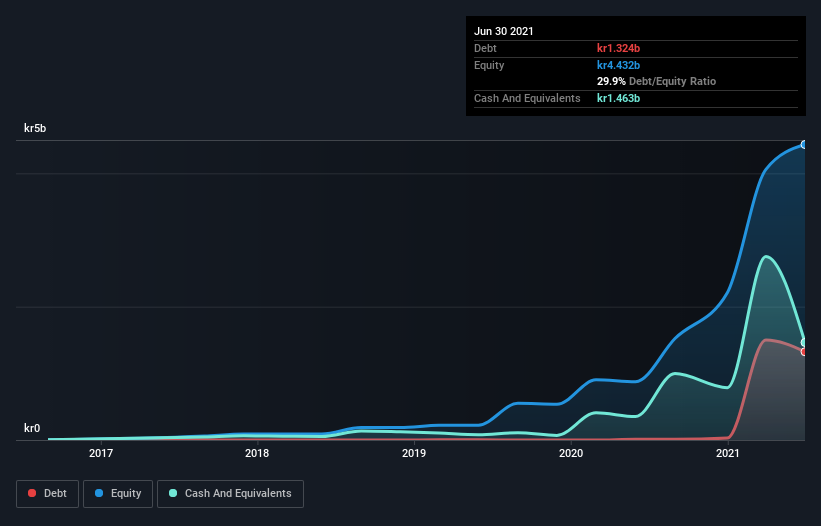
The external fund manager backed by Berkshire Hathaway's Charlie Munger, Li Lu, makes no bones about it when he says 'The biggest investment risk is not the volatility of prices, but whether you will suffer a permanent loss of capital.' So it seems the smart money knows that debt - which is usually involved in bankruptcies - is a very important factor, when you assess how risky a company is. As with many other companies BICO Group AB (publ) (STO:BICO) makes use of debt. But the real question is whether this debt is making the company risky.
What Risk Does Debt Bring?
Debt assists a business until the business has trouble paying it off, either with new capital or with free cash flow. Ultimately, if the company can't fulfill its legal obligations to repay debt, shareholders could walk away with nothing. However, a more frequent (but still costly) occurrence is where a company must issue shares at bargain-basement prices, permanently diluting shareholders, just to shore up its balance sheet. Of course, the upside of debt is that it often represents cheap capital, especially when it replaces dilution in a company with the ability to reinvest at high rates of return. When we think about a company's use of debt, we first look at cash and debt together.
Check out our latest analysis for BICO Group
What Is BICO Group's Debt?
The image below, which you can click on for greater detail, shows that at June 2021 BICO Group had debt of kr1.32b, up from kr10.1m in one year. But it also has kr1.46b in cash to offset that, meaning it has kr138.8m net cash.

How Healthy Is BICO Group's Balance Sheet?
Zooming in on the latest balance sheet data, we can see that BICO Group had liabilities of kr480.5m due within 12 months and liabilities of kr1.78b due beyond that. Offsetting these obligations, it had cash of kr1.46b as well as receivables valued at kr305.7m due within 12 months. So its liabilities total kr492.7m more than the combination of its cash and short-term receivables.
This state of affairs indicates that BICO Group's balance sheet looks quite solid, as its total liabilities are just about equal to its liquid assets. So while it's hard to imagine that the kr30.6b company is struggling for cash, we still think it's worth monitoring its balance sheet. While it does have liabilities worth noting, BICO Group also has more cash than debt, so we're pretty confident it can manage its debt safely. There's no doubt that we learn most about debt from the balance sheet. But it is future earnings, more than anything, that will determine BICO Group's ability to maintain a healthy balance sheet going forward. So if you want to see what the professionals think, you might find this free report on analyst profit forecasts to be interesting.
In the last year BICO Group wasn't profitable at an EBIT level, but managed to grow its revenue by 240%, to kr748m. When it comes to revenue growth, that's like nailing the game winning 3-pointer!
So How Risky Is BICO Group?
By their very nature companies that are losing money are more risky than those with a long history of profitability. And we do note that BICO Group had an earnings before interest and tax (EBIT) loss, over the last year. And over the same period it saw negative free cash outflow of kr324m and booked a kr96m accounting loss. Given it only has net cash of kr138.8m, the company may need to raise more capital if it doesn't reach break-even soon. Importantly, BICO Group's revenue growth is hot to trot. While unprofitable companies can be risky, they can also grow hard and fast in those pre-profit years. When analysing debt levels, the balance sheet is the obvious place to start. But ultimately, every company can contain risks that exist outside of the balance sheet. These risks can be hard to spot. Every company has them, and we've spotted 2 warning signs for BICO Group you should know about.
When all is said and done, sometimes its easier to focus on companies that don't even need debt. Readers can access a list of growth stocks with zero net debt 100% free, right now.
Valuation is complex, but we're here to simplify it.
Discover if BICO Group might be undervalued or overvalued with our detailed analysis, featuring fair value estimates, potential risks, dividends, insider trades, and its financial condition.
Access Free AnalysisThis article by Simply Wall St is general in nature. We provide commentary based on historical data and analyst forecasts only using an unbiased methodology and our articles are not intended to be financial advice. It does not constitute a recommendation to buy or sell any stock, and does not take account of your objectives, or your financial situation. We aim to bring you long-term focused analysis driven by fundamental data. Note that our analysis may not factor in the latest price-sensitive company announcements or qualitative material. Simply Wall St has no position in any stocks mentioned.
Have feedback on this article? Concerned about the content? Get in touch with us directly. Alternatively, email editorial-team (at) simplywallst.com.
About OM:BICO
BICO Group
Operates as a bioconvergence company in North America, Europe, Asia, and internationally.
Good value with reasonable growth potential.


